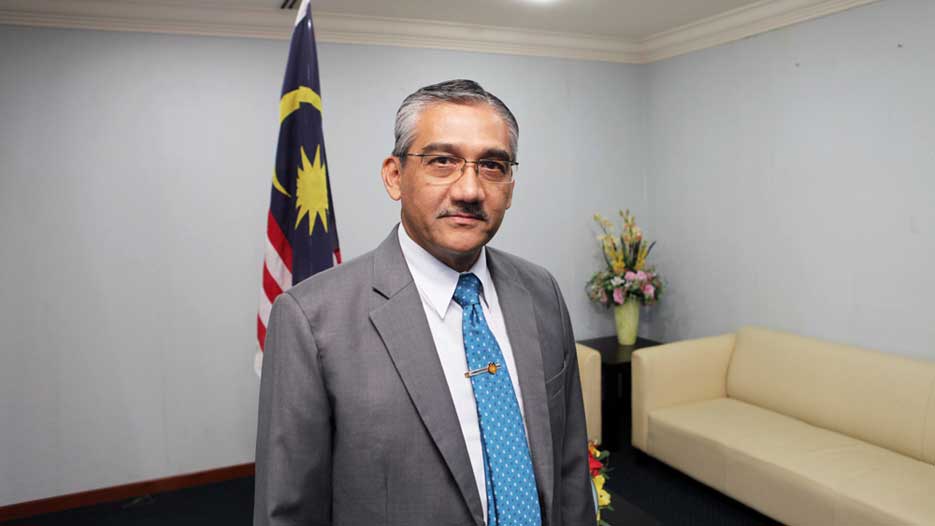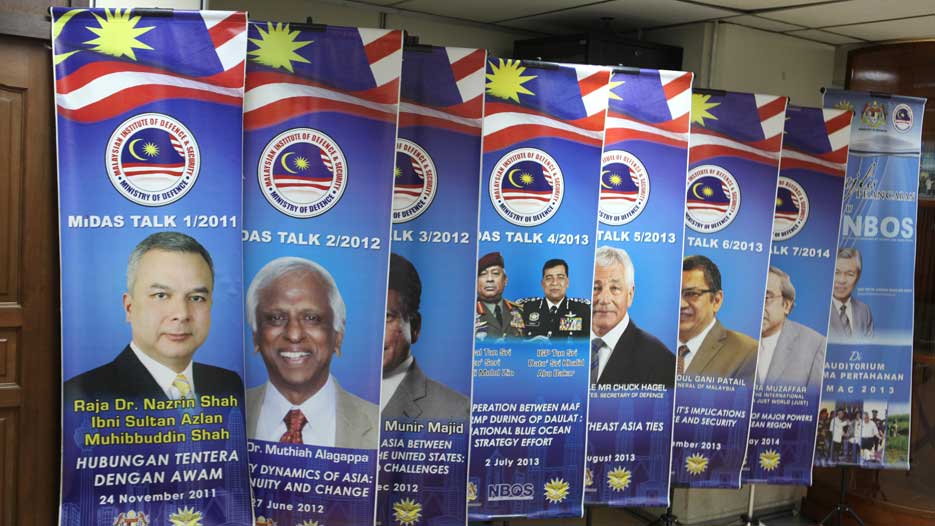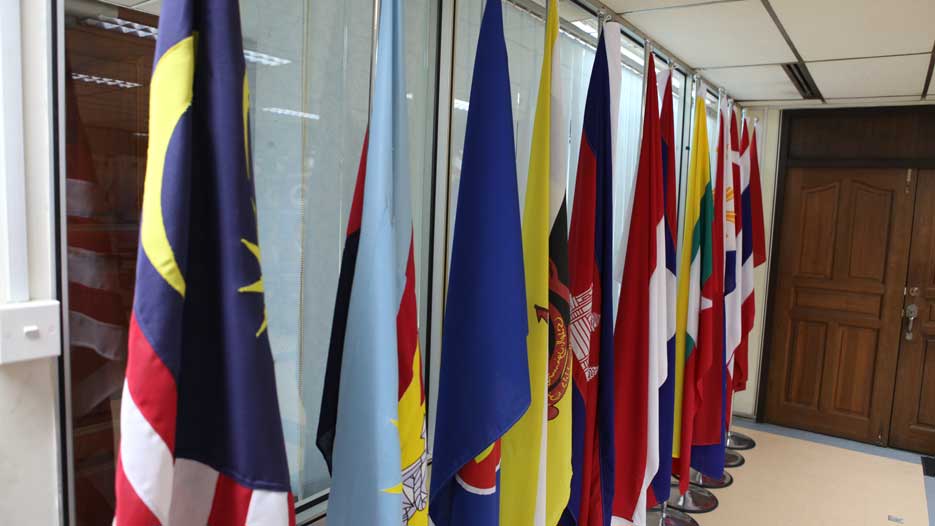Defense in Malaysia: Major Security Threats are Terrorism, Transnational Crimes
Non-traditional security (NTS) issues are of our concern. It is multifaceted, evolves very rapidly and could emerge in an unexpected manner. Among of NTS issues are terrorism/militancy, transnational/trans-boundary crimes, cyber-security and environment security- climate change, natural disasters etc.
Interview with Lt Gen Datuk Dr William Stevenson, Chief Executive of MIDAS

Tell us about your milestones.
MiDAS was established in April 2010 under the purview of Ministry of Defence Malaysia and was formally institutionalised in Sep 2012. Even though in its infancy stage, MiDAS has successfully organized three international conferences known as Putrajaya Forum. This forum covered topic such as:
2010: Emerging Regional Security Architecture
2012: Enhancing Multilateralism for Regional Defence and Security
2014: Strengthening Security and Regional Stability
MiDAS also organized MiDAS Conference at the national level. We have
organized two conferences with selected themes:
2011: Reinforcing National Defence & Security: A Revisit
2013: Strengthening National Resilience
Besides the above programs, MiDAS also organises the MiDAS Talk series (every quarterly; MiDAS Dialogue (on opportunity basis) and roundtable discussions with counterparts within and foreign. We publish a journal, the Journal of Defence and Security (JDS) twice a year and circulate it internationally. It is also available in our webpage.
MiDAS has also established itself and represents Malaysia as a member of NADI, i.e. Network of ASEAN Defence and Security Institutions. This is a network among all countries of ASEAN where regional defence and security issues are discussed at Track II Level and recommendation submitted to the ASEAN Defence Minister Meeting (ADMM). This effort undertaken to a certain extent contributes towards regional peace and stability.
What are the most significant achievements? What effects (direct and indirect) the institution has had on the policy making in Malaysia?
Organizing conferences, forums, seminars, discussions and talks is one of MiDAS core businesses. These are avenues and platforms that promote knowledge sharing and generate new ideas especially for policy makers and defence and security practitioners through the process of open discussion with experts and professionals. Besides conferences, MiDAS also conducted a series of Labs/Seminars such as:
Security Lab which was held in 2012 following the resolution achieved in MiDAS Conference 2012 which envisages deliberating in detail six major security issues namely Land Border Security; Maritime Security; Airspace Security; Cyber Security; Food Security and HADR and proposed security strategies for the National Security Council consideration. The lab was conducted in a series of lab discussions which brought together all the subject matter experts in all related fields. MiDAS successfully conducted the lab series and produced a comprehensive report to provide relevant inputs to NSC in formulating the National Security Policy.
Putrajaya Forum – the recent forum that was held in April 2014 was the largest and the most successful forum so far. We brought together Ministers of Defence, Deputy Ministers, Chiefs of Defence Force, Secretaries of Defence from ASEAN, Asia Pacific as well as US and Europe. The forum was attended by more than 750 participants from local and international. With the theme “Strengthening Security and Regional Stability”, Malaysia believes that we need to embrace greater cooperation and encourage deeper commitment to the rule of law in addressing current and emerging security issues and challenges regionally and globally.
This forum encourages the sharing of thoughts, perspectives, experiences and best practices in an informal setting.
MiDAS Conference – the last Conference that we had on 28 November 2013 addressed the issue of national interest with the theme “Strengthening National Resilience”. As Malaysia is at the final lap of becoming a fully developed nation by 2020 there are many challenges that need particular attention including national identity for national integration and unity, as well as community preparedness in responding to crisis. At the end of the conference, some resolutions were proposed and sent to the Ministry of Education and National Unity and Integration Department Malaysia for necessary follow up action.
How important is the defense industry for the Malaysian economy?
Moving towards a developed nation status, Malaysia is also building up its home-grown defence industries capabilities in areas of aerospace, maritime, arms/weapon and ICT. We have leading local defence industry players like Boustead Heavy Industries, DEFTECH, ATSC, SMEO, SAPURA and AIROD to name a few. Being ‘Self-reliant’ is one of the underlying principles of defence under the National Defence Policy.

Do you see the share of defense-related industries growing in the future?
Yes. ASEAN defence spending is showing an exponential growth every year. It grew 5% to US35 billion in 2013 and is expected to rise to US40 billion in 2016. Most of the spending involves big purchases from western suppliers in Europe and the US. In realising the heavy reliant on foreign supplies and the needs to be independent, the 4th ADMM meeting in 2010 had agreed to establish ASEAN Defence Industry Collaboration (ADIC).
Its main objectives among others are to collaborate on common projects through partnerships, joint ventures and co-production; and increase ASEAN technology and industrial competitiveness in defence and dual-use industry. Thus, ADIC effort shall complement ASEAN’s existing measures in enhancing confidence-building measures and in contributing to peace and the general economic growth of the countries in the region.
What are the current global and regional security concerns? How are you addressing them?
Non-traditional security (NTS) issues are of our concern. It is multifaceted, evolves very rapidly and could emerge in an unexpected manner. Among of NTS issues are terrorism/militancy, transnational/trans-boundary crimes, cyber-security and environment security- climate change, natural disasters etc.
We have multiple platforms to address these issues and challenges, through official and non-official (track II) forums. The official forum involves the Ministers and Ministries/relevant security and enforcement agencies. While non-official or track II forum is through the security networks such as NADI, Network of ASEAN Defence and Security Institutions which MiDAS is one of its core institutes member. We discuss current issues as well as potential challenges and provide practical recommendations to the ASEAN Defence Ministers Meeting (ADMM) consideration.
Where do you see Malaysia positioned in the regional security context?
Malaysia is in the leading role for ASEAN in 2015, while at the same time Malaysia was recently accepted to be the non-permanent member in UNSC for 2015-2016. It is the perfect timing for Malaysia’s leadership to prove to the region and the world that Malaysia is ready to contribute significantly towards regional and global peace and stability; Especially in addressing pressing issues like the South China Sea, terrorism and radicalism.
MiDAS will also playing host for NADI next year. As the Chairman, we will be in the driving seat to lead and determine our future plans and priorities. We will remain committed to support the track I process (ASEAN defence track) by providing timely and relevant analysis as well as workable suggestions and recommendations.

What are the major threats to Malaysia?
It could be internal as well as external threats. Internal threats may affect national security and stability. Some benign issues like racial disharmony, religious sensitivity and ideological extremism could spark a security threat to the nation if not well manage.
Trans-national and trans-boundary organised crimes such as cyber related crimes, drugs, human tutoring and money laundry are threats that has an impact on the countries security which can also affect economic development and growth.
External threats like infiltration and intrusion of non-state actors into our porous borders. Lahad Datu, Sabah intrusion incident by the Sulu intruders in February 2013 was ‘a wake-up call’ for the Malaysian security forces that peace is never to be taken for granted.
What needs to be done to further improve innovation in the defense industry?
Innovation in the defence industry could be improved through the transfer of technology (TOT). It is a government policy for any purchase above RM50 million with foreign companies and RM100 million with local companies, to have elements of counter trade/off set programs which include TOT. TOT is significant in developing local capacity and capability in certain niche area as well as improving level of competitiveness with other industry players. Local defence industry investment in Research and Development together with the Ministry of Defence and Universities focussed on creativity and innovation should be encouraged.
What needs to be done to further improve innovation in the defense industry?
Innovation in the defence industry could be improved through the transfer of technology (TOT).
It is a government policy for any purchase above RM50 million with foreign companies and RM100 million with local companies, to have elements of counter trade/off set programs which include TOT.
TOT is significant in developing local capacity and capability in certain niche area as well as improving level of competitiveness with other industry players. Local defence industry investment in Research and Development together with the Ministry of Defence and Universities focused on creativity and innovation should be encouraged.
What have been some of the results of the government’s innovation policies in Malaysia to date?
Government Transformation Plan (GTP) and the implementation of the National Blue Ocean Strategy (NBOS) initiatives at the national level. MiDAS is also tasked to monitor and coordinate the implementation of NBOS initiatives between Malaysian Armed Forces and other relevant ministries/agencies. The NBOS program/initiative is among the result of government’s innovation policies in which it is effective in breaking compartmentalisation and silos among ministries/agencies as well as efficient in budget spending and human resources. Some innovative projects circles.
How difficult is it to transform the economy into knowledge-based economy?
Malaysia has moved from agricultural based economy to industry based to technology to knowledge based and now to creativity and innovation based. For Malaysia to remain competitive, we need to keep abreast with global development and be competitive.
At the moment, Malaysia has moved up in the Global Competitive Index and at the 25th position compared with other countries in the world. The government has embarked on various transformation initiatives which should steer the country ahead. The government has also adopted the Blue Ocean Strategy concept and has implemented many initiatives addressing both the Capital Economy and People’s Economy as had been mentioned by our Prime Minister in the last Budget 2015 speech.
The initiatives are collaborative efforts that cut across Ministries and Agencies aimed at achieving national goals and for the well being of our people and betterment of the country.
How difficult is it to transform the economy into knowledge-based economy?
Malaysia has moved from agricultural based economy to industry based to technology to knowledge based and now to creativity and innovation based. For Malaysia to remain competitive, we need to keep abreast with global development and be competitive. At the moment, Malaysia has moved up in the Global Competitive Index and at the 25th position compared with other countries in the world. The government has embarked on various transformation initiatives that should steer the country ahead. The government has also adopted the Blue Ocean Strategy concept and has implemented many initiatives addressing both the Capital Economy and People’s Economy as had been mentioned by our Prime Minister in the last Budget 2015 speech. The initiatives are collaborative efforts that cut across Ministries and Agencies aimed at achieving national goals and for the well-being of our people and betterment of the country.